How do we save energy?
In our daily lives, we use lots of energy. Sometimes more than we need to.
More than half of the energy used to make electricity in the UK is wasted before it even gets to our homes, schools or workplaces. This waste costs a lot of money and has a negative impact on the environment.
In this article you can learn about:
- Why we need to save energy
- How we can reduce the energy we use
This resource is suitable for energy and sustainability topics for primary learners.
Video - Saving energy
In this video, learn how we can save energy at home.
Ah… hanging out at home.
It’s nice and cosy with the lights and the heating on, your phone charging while you message your friends, your little brother watching his favourite TV show.
But hang on a minute, how much energy are you using here?
Lots of the energy we use comes from fossil fuels, like burning gas to make heat, cook food or generate electricity.
That burning releases carbon dioxide into the atmosphere, which causes climate change.
Some of our energy comes from renewable sources, but we still don’t have enough of them.
So, we really need to save as much energy as we can!
Ah! There you go!
Dad’s filled the kettle to the very top when all he wants is one cup of tea.
Kettles use loads of energy, so if you want one cup, boil one cup!
And do you really need the heating on so high?
If you shut the doors and put on a jumper…
…you can turn the heating down and still be toasty!
And if wrapping up warm is good enough for you, it’s good enough for the house too!
Insulation stops heat from escaping, keeping the house warmer for longer, so you use the heating less.
Just like you and your jumper!
And what about the way we travel?
Thousands of people make five minute car journeys in Scotland every day.
Imagine if they all chose people-power instead?
It would reduce pollution, slow down global heating and be better for your health!
Going by bus or train is a good option too.
They both use up energy, but you can fit lots of people in them.
So per-person, they use way less fuel than cars.
We can also do lots of little things to save energy.
If you’ve only worn your clothes just once or twice, do they really need to go in the wash?
And when you leave a room, always remember to switch off the light, the radio, the TV…
…unless someone else is still using them, of course!
You can even save energy in the bathroom.
Baths use up lots of water, and a lot of energy!
A quick shower will do the job.
But, yeah. You’re right. Your little brother really could do with a wash.
Luckily, we don’t have to save energy on everything.
Let’s get him cleaned up!
Why do we need to save energy?
Much of the energy we use on a daily basis comes from fossil fuels (coal, oil and gas).
These are non-renewableNatural resources that cannot be replaced after they are used. This means that they exist in a fixed amount on Earth. Fossil fuels such as coal, oil and gas are all non-renewable resources. sources of energy. Burning fossil fuels pollutes the environment and can make us ill. It releases carbon dioxideA gas that is naturally present in the atmosphere and a greenhouse gas. Trees absorb carbon dioxide and humans breathe it out., a greenhouse gas that contributes towards and climate changeThe change in the usual conditions of weather (temperature, wind, rainfall etc.) on Earth over a long period of time. The climate has changed throughout the history of Earth, but current climate-change refers to an increase in global temperature..
There are now lots more sources of renewable Something that does not run out when used. energy, like wind farms and solar farms. These all take up space and need lots of resources to make them so we still need to reduce the amount of energy we use.
Learn more about different types of energy here: What is energy?
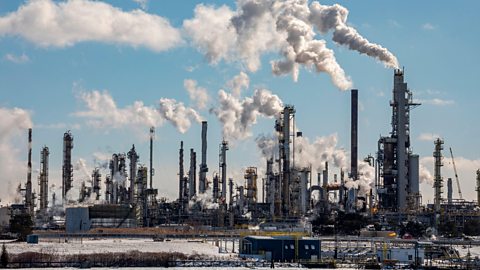
How can we save energy?
When we have instant access to energy, we have a responsibility to use energy sensibly and not to waste it.
Here are some ways we can save energy in our daily lives:
How much energy does transport use?
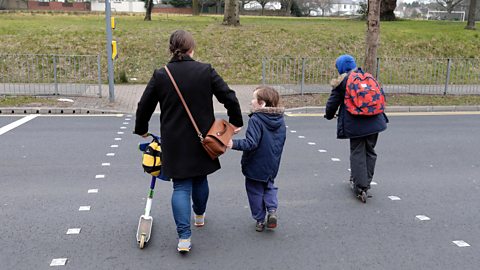
In 2018, transport of people and goods was responsible for nearly a quarter of the global greenhouse gases that harm the environment.
Short and unnecessary car journeys contribute to this. Instead of driving a short five-minute journey, we could walk. Or, if a journey is on a public transport route, we can take the bus or train instead of driving.
Learn more about the impact of travel and transport on the environment:Transport and sustainability

How much energy does heating use?
We use a lot of energy to heat our homes.
We can use less energy to start with by:
- putting on a jumper
- turning the heating down a little
We can also reduce the amount of energy that gets wasted by:
- making sure that we turn off radiators in rooms that we don’t need to heat
- have a heating system that lets us heat specific rooms
We should insulate our houses to make sure that heat energy doesn’t escape. Most people can now get a smart meter which helps them keep a track of how much energy they are using.
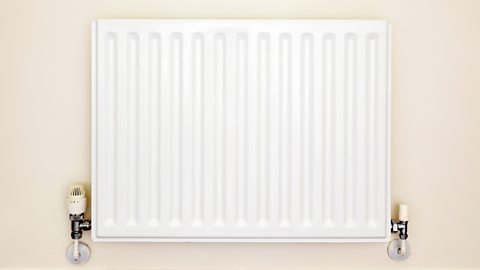
Image caption, Reducing the amount of energy we use at home is not only good for the environment but it also helps save money. (incamerastock / Alamy Stock Photo)
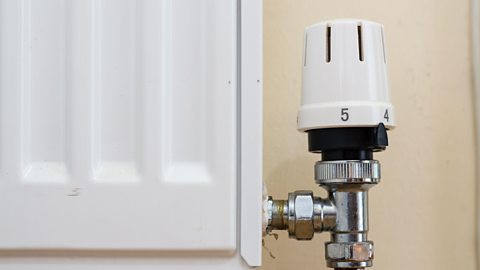
Image caption, You can turn a radiator's heat down by twisting its thermostat valve to a lower number. (Kalki / Alamy Stock Photo)
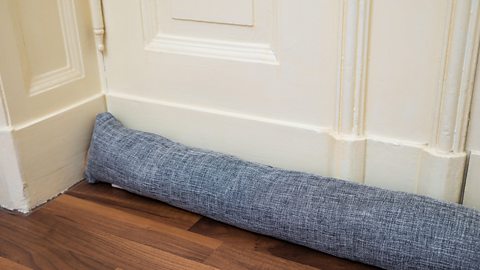
Image caption, A draft excluder covers up the gap between a door and the floor. It is a simple way to keep a room warmer without turning the heating up. (Andriy Popov / Alamy Stock Photo)
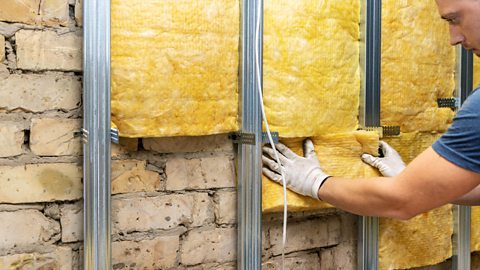
Image caption, Adding insulation to our homes (lining walls and roofs with material that traps heat) is a great way to stop heat escaping from our homes. Insulation costs money but saves money on energy bills. (ronstik / Alamy Stock Photo)
1 of 4
How to save electricity

Our devices and machines use lots of electricity, sometimes when we’re not even using them. Turning off devices like televisions, speakers, video games consoles and computers when we don't need them can help save energy.
Kitchen appliances such as kettles, tumble dryers, washing machines and dishwashers all use a lot of electricity. We can reduce our energy wastage by doing things like:
- only boiling as much water as we need at one time
- hanging washing outside instead of using the tumble dryer or hanging clothes on radiators
- washing clothes on a lower temperature (or just folding some clothes away again if they’re not smelly or dirty)
- washing the dishes using a basin of water instead of the full sink
- having a short shower instead of a bath to save on hot water
- using low energy LED lightbulbs

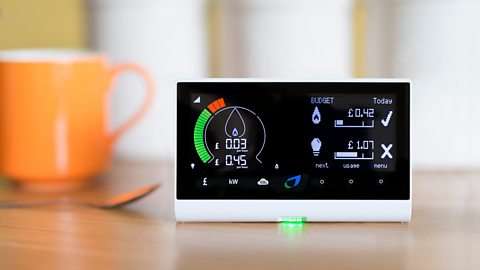
Benefits and risks of energy use
Benefits
- Reducing the amount of energy we use is good for the environment. By reducing the amount of energy we use, we can make a positive contribution by reducing the amount of harmful greenhouse gases produced.
- Saving energy also means saving money. By reducing the amount of energy we use, we can also reduce the amount we pay for our energy bills.
- We have the power to make a difference. The decisions we make can help the environment. Many people are starting to make choices about the types of energy they use, choosing energy suppliers who use renewable sources.
Risks
- The more energy we use, the more we harm the environment. As the amount of fossil fuels being burned increases, so does the amount of harmful gases that lead to climate change.
- An increase in greenhouse gases also leads to:
- Global heating – rising temperatures, heatwaves and drought
- Higher sea levels as the polar ice caps melt
- Abnormal weather patterns across the world
- An increase in natural disasters caused by changing weather
- As we have to pay for the energy we use, the cost to us increases the more energy we use.

Key words about energy
Sorry, something went wrongCheck your connection, refresh the page and try again. - Coal, oil and gas are the three fossil fuels – these are our non-renewable energy sources. They are called fossil fuels because they are made from dead animals and plants. These animals and plants are compressed underground over millions of years and they eventually turn into fossil fuels.
Sorry, something went wrongCheck your connection, refresh the page and try again. - Natural resources that cannot be replaced after they are used. There is a fixed amount of them on Earth. Fossil fuels such as coal, oil and gas are all non-renewable resources.
Sorry, something went wrongCheck your connection, refresh the page and try again. - Gases in the atmosphere that trap heat. Although they are needed to keep Earth warm enough for life to exist, there is now too much of them, contributing to climate change. Carbon dioxide is one of the greenhouse gases.
Sorry, something went wrongCheck your connection, refresh the page and try again. - A natural gas that is all around us. It is essential for life on Earth. For example, animals (including humans) breathe in oxygen and breathe out carbon dioxide, while plants do the opposite. But carbon dioxide is also created when fossil fuels are burned. This is a problem because there is now too much of it in the atmosphere. As a greenhouse gas, carbon dioxide is the main cause of global heating and therefore climate change.
Sorry, something went wrongCheck your connection, refresh the page and try again. - Also called global warming. The increase in the Earth's average temperature, largely due to the greenhouse gases released into the environment when people burn fossil fuels.
Sorry, something went wrongCheck your connection, refresh the page and try again. - This is the long-term change in weather patterns (temperature, wind, rainfall etc.) on Earth, including its side-effects, for example increased drought and flooding.
Sorry, something went wrongCheck your connection, refresh the page and try again. - This is a source of energy that does not run out and is sustainable. The power of the sun, wind and water can be harnessed and used to generate energy through a wide range of technologies such as solar panels, wind turbines and wave and tidal machines.
Test your knowledge
Quiz
Challenge
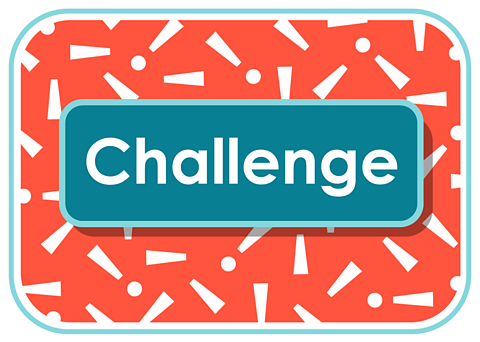
Make a list of ways that you can save energy at home
- Speak to an adult about things that you can do as a family to help reduce the amount of energy you use.
- If you have a smart meter at home, can you use it to record the amount of energy you use before and after you make changes, so you can see how much energy and money you have saved.
- Think about how you can encourage other members of your family to save energy too.
- Talk to your teacher about looking at how your school uses (or wastes) energy. Can you find ways to cut down on energy use in class or across the whole school?
More on Sustainability
Find out more by working through a topic
- count2 of 28
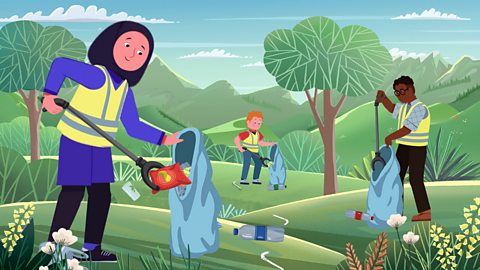
- count3 of 28
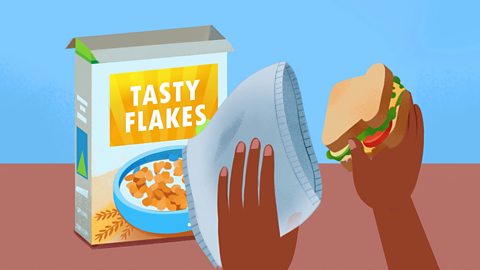
- count4 of 28
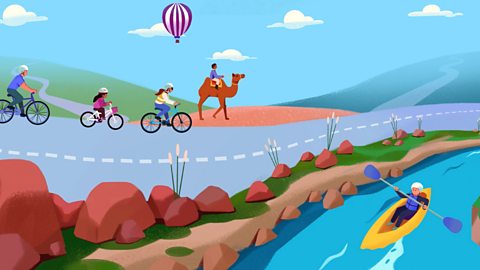
- count5 of 28
